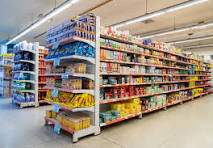
Nigeria, with its large and growing population, presents a significant market for the retail sector, particularly for supermarkets that offer convenience, variety, and a modern shopping experience.
A supermarket is a self-service retail store offering a wide variety of food and household products, organized into distinct departments. Key characteristics of a supermarket include:
Self-Service Format: Customers browse and select products independently.
Wide Product Range: Offering a diverse selection of groceries, fresh produce, meat, dairy, baked goods, household items, and sometimes non-food items like clothing or electronics.
Organized Layout: Products are arranged in aisles and departments for easy navigation.
Larger Store Size: Typically larger than smaller grocery stores or convenience stores.
Checkout Counters: Centralized checkout areas for payment.
Supermarkets can be categorized based on their size, target market, and product offerings:
Conventional Supermarkets: These are the most common type, offering a wide range of groceries and household items at competitive prices.
Hypermarkets/Superstores: These are very large stores that combine a supermarket with a department store, offering a vast selection of food and non-food items.
Discount Supermarkets: These focus on offering lower prices by reducing frills and operating with lower overhead costs.
Specialty Supermarkets: These cater to specific customer segments, such as organic food, ethnic foods, or gourmet products.
Nigeria’s supermarket scene is increasingly competitive, with several key players dominating the market:
Shoprite: A South African retail giant with a significant presence across Nigeria.
SPAR: An international retail chain with a strong presence in major Nigerian cities.
Market Square: A growing Nigerian supermarket chain with a focus on affordability.
Prince Ebeano Supermarket: A popular local chain, particularly in Lagos.
Next Cash and Carry: A wholesale supermarket chain catering to both retail and wholesale customers.
These are just a few of the notable supermarkets operating in Nigeria. The market also includes numerous smaller local supermarkets and independent retailers.
The Nigerian food & grocery retail market had total revenues of $52.3 billion in 2022, representing a compound annual growth rate (CAGR) of eight point one percent (8.1%) between 2017 and 2022, with over seven thousand (7,000) supermarkets and grocery stores spread across the country.
Nigeria’s retail sector is one of the largest in Africa, driven by a large and growing population, increasing urbanization, and rising disposable incomes. The supermarket segment has experienced significant growth in recent years, with increasing consumer preference for modern retail formats.
While precise figures are difficult to obtain due to the informal nature of some parts of the retail sector, market research suggests a multi-billion dollar market with substantial growth potential. Factors contributing to this growth include:
Population Growth: Nigeria’s large and rapidly growing population creates a significant consumer base.
Urbanization: Increasing urbanization leads to greater demand for convenient shopping options like supermarkets.
Rising Middle Class: The expanding middle class has greater disposable income and a preference for modern retail formats.
Changing Consumer Preferences: Nigerian consumers are increasingly adopting modern shopping habits and seeking greater convenience and variety.
Several key trends are shaping the future of the supermarket industry in Nigeria:
E-commerce and Online Grocery Delivery: The growth of e-commerce and online grocery delivery services is changing the retail landscape, with supermarkets increasingly offering online shopping options.
Focus on Value and Affordability: Consumers are increasingly price-sensitive, driving demand for value-for-money products and promotions.
Emphasis on Local Sourcing and Fresh Produce: There is a growing preference for locally sourced products and fresh produce.
Expansion into Smaller Cities and Towns: Supermarkets are increasingly expanding their reach beyond major cities into smaller towns and urban areas.
Increased Use of Technology: Supermarkets are adopting new technologies, such as point-of-sale (POS) systems, inventory management systems, and customer loyalty programs, to improve efficiency and customer service.
Establishing and operating a supermarket in Nigeria presents several challenges:
Infrastructure Deficiencies: Inadequate infrastructure, such as unreliable power supply and poor road networks, can increase operating costs and create logistical challenges.
High Operating Costs: Operating costs, including rent, utilities, and security, can be high, particularly in urban areas.
Supply Chain Challenges: Maintaining a reliable and efficient supply chain can be challenging due to logistical issues and supply disruptions.
Competition from Informal Retailers: Competition from smaller local shops and informal markets can be intense.
Security Concerns: Security concerns in some parts of the country can impact operations and increase costs.
Access to Finance: Securing funding for establishing and expanding supermarket operations can be difficult.
Despite the challenges, the supermarket industry in Nigeria offers significant opportunities for growth and expansion. The large and growing population, coupled with increasing urbanization and rising disposable incomes, creates a strong foundation for market growth. Key opportunities include:
Expanding into Underserved Markets: There is significant potential for expanding supermarket operations into smaller cities and towns that are currently underserved.
Developing Online and Omnichannel Strategies: Investing in e-commerce and online grocery delivery services can reach a wider customer base and enhance convenience.
Focusing on Value and Affordability: Offering competitive prices and attractive promotions can attract price-sensitive consumers.
Building Strong Supply Chain Partnerships: Establishing strong relationships with local suppliers and distributors can improve supply chain efficiency.
Adopting Technology to Improve Efficiency and Customer Service: Investing in technology can streamline operations, improve inventory management, and enhance the customer experience.
If you are interested in purchasing our feasibility report on establishing a supermarket business in Nigeria, click on the link below
REPORT TITLE: ESTABLISHING A SUPERMARKET BUSINESS IN NIGERIA; THE FEASIBILITY REPORT.
Establishing a supermarket in Nigeria is a viable business venture with significant growth potential. The large and growing market, coupled with increasing consumer demand for modern retail formats, creates a favorable environment for success.
However, careful planning, thorough market research, and effective management are essential for navigating the challenges and capitalizing on the opportunities presented by this dynamic market. Addressing infrastructure limitations, managing operating costs, and developing strong supply chain partnerships will be crucial for long-term success in the Nigerian supermarket industry.
Custom Research Request
Still haven't found what you're looking for?
Speak to our Custom Research Team.
